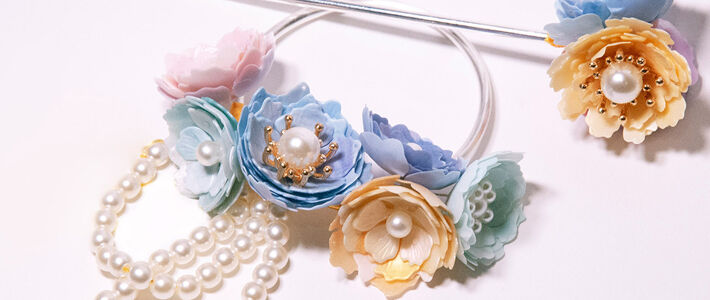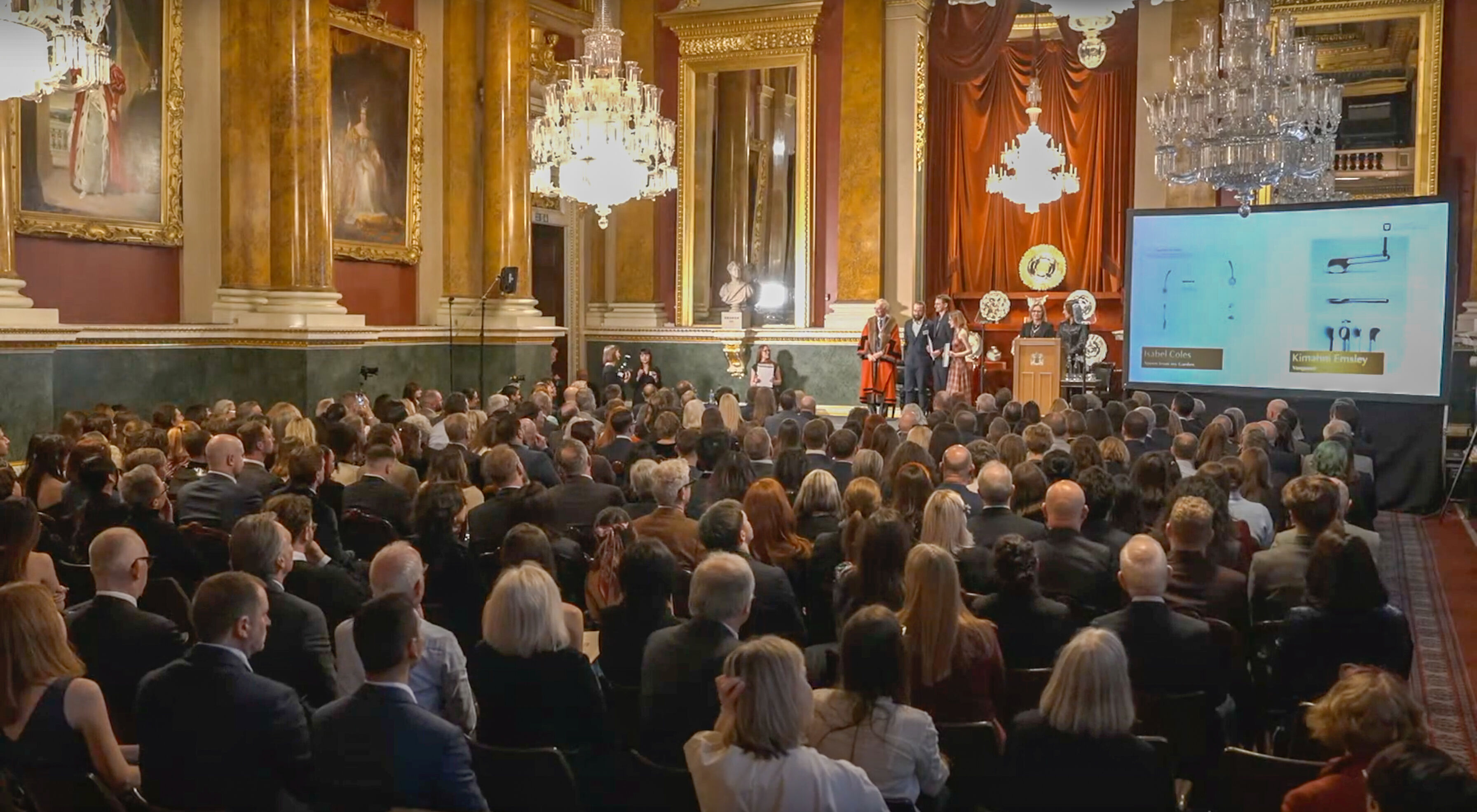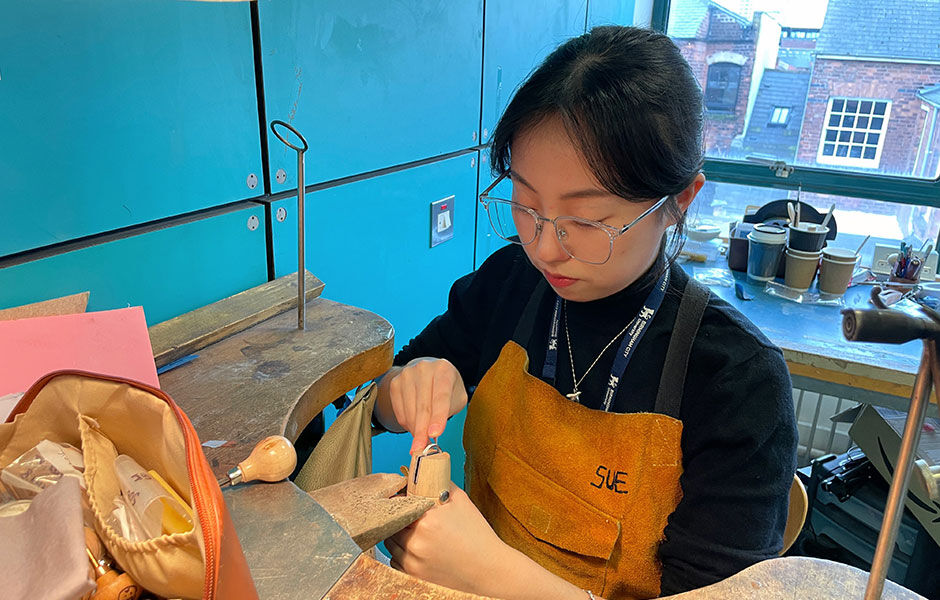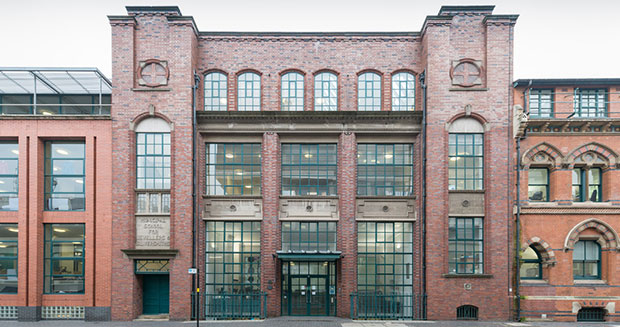
Jewellery and Objects - BA (Hons)
Currently viewing course to start in 2026/27 Entry.
Experiment with materials, techniques and processes on a highly respected jewellery design degree course. You are encouraged to pursue innovation, challenge conventions and push the boundaries of the discipline. You will develop practical skills alongside intellectual engagement and inventive thinking....
- Level Undergraduate
- Study mode Full Time
- Award BA (Hons)
- Start date September 2026
- Fees View course fees
- Subject
- Location School of Jewellery
This course is:
Available with Professional Placement year
Open to International Students
Overview
Experiment with materials, techniques and processes on a highly respected jewellery design degree course. You are encouraged to pursue innovation, challenge conventions and push the boundaries of the discipline.
You will develop practical skills alongside intellectual engagement and inventive thinking. Creative problem solving is a continuous thread, where a questioning attitude and experimental approach to materials, perceptions, concepts and outcomes is encouraged.
Individuality is fundamental to your creative development, personal philosophy and direction. The School of Jewellery building is uniquely positioned in the heart of the Jewellery Quarter enabling you to be fully immersed in the industry from the first day of your studies.
What's covered in this course?
This practical degree is an internationally-respected jewellery design course. It gives you the freedom to develop your own creativity by encouraging you to experiment with a variety of ideas, materials, processes and techniques.
You’ll be supported and encouraged to create innovative designs to a high standard of professionalism, and have the chance to enter competitions and awards.
In your first year of study, the focus is on developing traditional processes followed by experimental materials investigation, allowing you to enter the second year with a range of skills and the confidence to explore various optional topics, live and collaborative projects.
Past student Ruth Hallows was chosen to produce an exclusive jewellery collection, to be sold in Argos nationwide and online. She gained the opportunity to work alongside Argos' jewellery buying team and manufacturer Optima, spending time learning the process of how her collection would be developed from design through to production.
Past students have also undertaken work experience with the likes of Topshop, Tatty Devine and Kath Libert.
You can be guided by your own inspiration. While studying, you will have the opportunity to host a number of jewellery exhibitions, which gives you the opportunity to exhibit and sell your pieces to the public.
You and your peers’ final collections span the breadth of the discipline of contemporary jewellery and objects, often relating to broader art and design disciplines such as fashion, accessories, theatre, product design and fine art.
The School of Jewellery is internationally renowned, in the heart of Birmingham’s famous Jewellery Quarter. The historical facade of our Vittoria Street building conceals a contemporary environment including workshops, a specialist library, the Vittoria Gallery and exhibition space.
Professional Placement year
This course offers an optional professional placement year. This allows you to spend a whole year with an employer, following successful completion of your second year, and is a great way to find out more about your chosen career. Some students even return to the same employers after completing their studies.
If you choose to pursue a placement year, you will need to find a suitable placement to complement your chosen area of study. You will be able to draw on the University’s extensive network of local, regional, and national employers, and the support of our Careers teams. If you are able to secure a placement, you can request to be transferred to the placement version of the course.
Please note that fees are payable during your placement year, equivalent to 20% of the total full-time course fee for that year.
The BA Hons Jewellery and Objects programme empowers its students to create innovative jewellery and objects which challenge the boundaries of the discipline, enabling our graduates to be uniquely positioned to lead and contribute to the wider professional field.
Rebecca Skeels - Course Director
Why Choose Us?
- The jewellery and objects course encourages you to develop your own personal style and enables you to design, develop and launch your own highly innovative, contemporary and thought-provoking products.
- Founded in 1890, our internationally renowned School of Jewellery is the largest in Europe, located in the heart of Birmingham’s famous Jewellery Quarter. An estimated 40 per cent of British jewellery is still made there today and you’ll gain contacts, inspiration and experience.
- The course benefits from specialist technicians, academic and support staff. We also have a rolling programme of Artist in Residences (AIRs) who have diverse skills and knowledge to share with you and contribute to your learning experience.
- Sponsorship, prizes, live projects and strong collaborative links with industry will help you to develop an entrepreneurial outlook and an insight into the professional world.
- We have an excellent reputation for highly employable, creative graduates with an in-depth understanding of the latest technology and the manufacturing industry. With many graduates progressing to postgraduate study.
- Our onsite Technology Hub offers expertise in a range of industry-related techniques, including CAD and manufacturing, rapid prototyping, surface finishing, reverse engineering and project management.
Open Events
Join us for our next Open Event where you'll be able to learn about this course in detail, chat to students, explore our campus and tour accommodation.
Next Open Event: 8 January 2026
Entry Requirements
Essential requirements
112 UCAS Tariff points. Learn more about UCAS Tariff points.
As creativity is an important part of this course, you are expected to submit a portfolio as part of the selection process. This is your opportunity to show your ideas and skills to our tutors.
If you are not studying a creative subject at Level 3, you can still apply for this course. Our portfolio guidance information includes alternative options for how you can show us your passion for art.
If you have a qualification that is not listed, please contact us.
Fees & How to Apply
UK students
Annual and modular tuition fees shown are applicable to the first year of study. The University reserves the right to increase fees for subsequent years of study in line with increases in inflation (capped at 5%) or to reflect changes in Government funding policies or changes agreed by Parliament. View fees for continuing students.
Award: BA (Hons)
Starting: Sep 2026
- Mode
- Duration
- Fees
- Full Time
- 3 years
- £9,535 in 2026/27 ✱ Important note for this price
- Apply via UCAS
(↩Back to price) * The Government is proposing to apply an inflationary increase to regulated tuition fees for 2026/27 and the University is planning on increasing fees to that maximum level once confirmed.
International students
Annual and modular tuition fees shown are applicable to the first year of study. The University reserves the right to increase fees for subsequent years of study in line with increases in inflation (capped at 5%) or to reflect changes in Government funding policies or changes agreed by Parliament. View fees for continuing students.
Award: BA (Hons)
Starting: Sep 2026
- Mode
- Duration
- Fees
- Full Time
- 3 years
- £18,970 in 2026/27
Guidance for UK students
UK students applying for most undergraduate degree courses in the UK will need to apply through UCAS.
The Universities and Colleges Admissions Service (UCAS) is a UK organisation responsible for managing applications to university and college.
Applying through UCAS
- Register with UCAS
- Login to UCAS and complete your details
- Select your course and write a personal statement
- Get a reference
- Pay your application fee and submit your application
Portfolio guidance
If you receive an offer to study this course, you will be required to submit a portfolio. We ask that this is submitted within four weeks of receiving your offer.
Please see our portfolio guidance page for tips on putting your portfolio together.
Portfolio guidance
If you receive an offer to study this course, you will be required to submit a portfolio. We ask that this is submitted within four weeks of receiving your offer.
Please see our portfolio guidance page for tips on putting your portfolio together.
Personal statement
The personal statement gives you a crucial opportunity to say why you’re applying and why the institution should accept you.
Here are the three areas you’ll need to address:
- Why do you want to study this course or subject?
Here’s where you explain what makes this course exciting to you. Think about your motivations for studying the course and your future plans. If you’re planning to take a year out, don't forget to give your reasons.
- How have your qualifications and studies helped you to prepare for this course or subject?
This is your chance to show what you’ve learned at school or college. You should include the skills and knowledge you’ve gained from education or training and how this will help you succeed in your chosen course.
- What else have you done to prepare outside of education, and why are these experiences useful?
Not everything you’ve learned comes from the classroom. Life experience counts too! You might want to talk about work experience, employment, or volunteering and how they’ve helped you develop the skills needed for your chosen course or future career.
Worried about Personal Statements?
If you've got no idea where to start or just want to check you're on the right track, we’ve got expert advice and real examples from our students to help you nail your personal statement. You can even download our ultimate personal statement guide for free.

Financial Support
We offer further information on possible undergraduate financial support. This includes the type of loans, grants and scholarships available both from the government and from Birmingham City University.
Course in Depth
Year one
During your first year, you’ll be introduced to techniques and ways of working as well as materials exploration and experimentation.
Contextual study modules will encourage a wider discussion and awareness of the field and allow you to develop a further understanding of the discipline.
In order to complete this course a student must successfully complete all the following CORE modules (totalling 100 credits):
The purpose of this first contextual studies module is to provide you with an introduction to the ideas that are important to the discipline. It will also enable you to begin to develop your research, writing and critical thinking skills and to communicate your ideas and learning effectively. The learning you engage with here will inform your studio practice and enable you to participate in academic research, reading and writing throughout your course.
This module introduces you to a range of techniques, processes and materials core to the discipline of Jewellery and Object making through exploration and practice. You will observe demonstrations and participate in a series of inductions to equipment, processes and techniques, which you will then be expected to explore and experiment with further in order to develop independent learning, alongside problem solving skills and attain an appropriate level of craftsmanship.
This module will continue to develop your knowledge of materials, techniques and processes, and challenge your understanding of the breadth and depth of possibilities within the field of jewellery and objects. You will be introduced to explorative methods that focus on developing ideas and design. You will explore research topics and be introduced into identifying personal lines of inquiry and appropriate individual methods of development. You will explore a range of methods to enable you to reflect, solve problems and evaluate your creative practice.
In order to complete this course a student must successfully complete at least 20 credits from the following list of OPTIONAL modules:
This modules is designed to introduce you to a range of ornamental surface techniques, processes and materials within the discipline of Jewellery and Objects through demonstration and practice. It will encourage exploration and experimentation with techniques and processes to develop an innovative approach to surface and ornament, whilst demonstrating high levels of craftsmanship.
In this module you will be introduced to fundamental hand-making skills through the production of samples, test pieces and a finished piece of jewellery. You will develop an understanding of traditional jewellery techniques and finishes that represent the term fine jewellery.
The science of gemmology is inextricably linked with jewellery, and an understanding of gemstones is essential for anyone involved in the manufacturing, repairing, buying or selling of fine jewellery. Today’s professional gemmologists face constant challenges as advances in synthetic gemstones and gemstone treatments become ever more sophisticated.
Core modules are guaranteed to run. Optional modules will vary from year to year and the published list is indicative only.
Year two
The second year explores further awareness of the breadth of the discipline, experimentation and risk taking, with introduction into more specialist pathways and optional modules, as well as exploring employability and collaborative practice.
In order to complete this course a student must successfully complete all the following CORE modules (totalling 80 credits):
In this module you will be required to engage with a range of practice methodologies and carry out sustained, in-depth exploration of different materials, processes and techniques through the development of your own ideas.
You will be encouraged to demonstrate an increasingly critical and analytical approach to your practice as well as to establish inquisitive and experimental attitudes to self-generated ideas that illustrate your developing personal artistic language.
This module further develops students understanding of research methodologies and the ways in which research approaches and methods inform and support studio practice across a range of outputs.
You will be supported in developing independent research and studio practice with the view to identifying and applying your learning to an individual project in preparation for ongoing Study.
In order to complete this course a student must successfully complete at least 40 credits from the following list of OPTIONAL modules.
This module aims to widen your studio practice and deepen your engagement with the chosen discipline. You will explore larger scale and broader ranging work beyond the context of wearability, to produce outcomes which convey a sense of themselves to the viewer and you will also communicate a developing personal aesthetic.
This module will introduce you to a range of materials encouraging you to undertake your own exploration of how a chosen material can be manipulated to achieve a variety of aesthetics. Alongside developing your knowledge of materials you will also develop critical thinking skills about how materials are/can be used to convey meaning in the field of Jewellery and Objects and within the broader context of art and design.
This module allows you to start to think about the idea of luxury and how it can be defined. You will expand your thinking to encompass the luxury sector of the market and explore the global significance of luxury jewellery brands, particularly how celebrity endorsement impacts on the perceptions of what luxury is.
You will consider the significance of brand heritage and examine whether reliance on loyalty to a brand can be maximised. You may also investigate how luxury brand extensions can be utilised. You need to understand how an emerging brand can find their identity through innovative and luxury marketing strategies.
This module provides an opportunity for you to apply your knowledge and skills to an external, professional brief. The brief will be set by an external client/ agency, in consultation with your supervisor, and it could be a ‘real life’ problem to be solved, or a simulation.
The purpose of this module is to enable you to develop professional attributes and subject skills through experience in the work place, and to critically reflect upon your learning in that context. You will normally be expected to arrange your own placement, with support from academic staff and ADM Careers+.
You also have the option to study a semester abroad:
A semester abroad is a fantastic opportunity to explore your subject in an international context at one of our partner institutions. Spending a period of time abroad as part of your degree allows you to understand a different culture, and gain specific knowledge about working practices in your host country. Connecting with fellow international students can broaden your network and increase your graduate prospects.
If you choose this option, you will study 60 credits of modules at the overseas partner institution and fewer modules at BCU.
Core modules are guaranteed to run. Optional modules will vary from year to year and the published list is indicative only.
Year three
In order to complete this course a student must successfully complete all the following CORE modules (totalling 120 credits):
The purpose of the module is to enable you to undertake a sustained, in-depth and theoretically informed research project exploring an area that is of personal interest to you. It is important that we can support you appropriately, so you will be guided towards choosing a research topic which is relevant to your discipline and in which your lecturers have expertise. The outcome may take the form of a written dissertation or a practice-based portfolio.
This module enables you to undertake a sustained, in-depth and theoretically informed practical Studio project exploring an area that is of personal interest to you. This will take place within a studio group context relevant to your chosen specialism and under the tutorage of a BA Tutor. You will work alongside like-minded peers to further enrich your enquiry. The outcome will take the form of a practice-based portfolio of Artefacts, Research and Design Development.
The overall aim of this module is to enable you to develop communication skills with which you may articulate your work to a high standard of professionalism, it will enable you to identify potential career opportunities which span the breadth of the discipline. This module you will explore key transferable skills which will enhance your employability and entrepreneurial skill sets. This module prepares you to launch a career within the creative industries as an industry graduate.
This module is designed to develop your ability and confidence to enable further material and processes research and apply design development and project management to your own initiated studio project.
You will propose, develop and realise a self-directed studio-based project focused on your own specific interests. You will be expected to evaluate appropriate methods of working for your project that articulates your identified field of interest.
Download course specification
Download nowThis is a three-year full-time design-based course exploring contemporary practice in the field of Jewellery and Object making. It gives you the opportunity to be creative and experimental within the design process, enabling you to design and make highly innovative, contemporary and thought-provoking work.
Primarily, you will learn through a practical hands-on learning experience called experiential learning. This means you will be learning by doing, and designing your work and collections via making. A great emphasis is placed on experimenting with a variety of materials, processes and techniques, which enables you to actively engage with and solve three-dimensional problems.
A questioning attitude to the discipline concepts and outcomes is encouraged. Being open-minded will help you to embrace the philosophy and aims of this course, as studies are intended to stretch and challenge your perception of the subject area, enabling you to develop practical skills alongside intellectual engagement.
We deliver rich, world-leading learning through making and doing. You’ll work on industry briefs set by external companies and have the opportunity to understand jewellery on an international scale through a study trip.
You also develop two-dimensional design skills to enable you to clearly think through your ideas and to communicate these to a wider audience. This practical approach to studying 3D design is strongly underpinned by theory and research into the field and its related disciplines.
A variety of learning and teaching methods are employed on this course, such as workshop activities, demonstration and practice, lectures, seminars, critiques, team work, presentations, module briefings, tutorials with staff and artist in residence, online learning, self-directed study, study visits, and one-day projects.
The course is assessed on 100 per cent coursework. We feel this best mirrors the way you’d work in the real world and so better prepares you for a career in the design industry.
Emphasis is placed on self-discovery. For that reason, self-directed study plays a significant role and a motivating attitude and enquiring mind is necessary to be successful.
Go Abroad
Undergraduate students can apply to study on an exchange programme for one semester at one of our partner universities across the globe. The opportunity to apply will depend on which course you study. The majority of courses offer this in the second semester of your second year. You will obtain credits which are recognised by BCU. Find out more about Go Abroad.
Alternatively, each year, the University offers students the chance to volunteer or study overseas at one of our partner institutions/organisations during the summer. In previous years, our students have been to France, Spain, Brazil, Fiji, India, Mexico, South Korea, and USA on a variety of activities. All students are eligible to apply, although PG and PhD students may require academic approval. Find out more about Go Abroad.

Students shine at 'Jewellery Oscars'
Students, graduates and artists in residence at the School of Jewellery picked up multiple accolades at the annual Craftsmanship and Design Awards, known as the ‘Jewellery Oscars'. Five students, four graduates and two artists in residence at the School of Jewellery excelled in these two categories to scoop Bronze, Silver and Gold awards.

Athena Swan Bronze Award
Our Jewellery, Fashion and Textiles courses have been awarded the Athena Swan Bronze Award for our commitment to Equality, Diversity and Inclusion (EDI).
Athena SWAN is a quality charter mark framework and accreditation scheme established and managed by the UK Equality Challenge Unit in 2005 that recognises and celebrates good practices in higher education and research institutions towards the advancement of gender equality: representation, progression and success.
Employability
Enhancing your employability skills
Upon completing this programme, you will have gained an understanding of a range of materials, their properties and the processes used to create jewellery and objects. Your appreciation of the breadth of the discipline will permit innovative creative practice beyond the boundaries of jewellery and objects.
Graduates demonstrate critical thinking skills, and are confident and able to challenge concepts and make judgements in order to enable personal directions to be followed, as well as bring new opportunities to companies and industry practice.
Using a range of techniques to communicate and realise design ideas, you will develop a professional level of promotion and articulation suitable for a range of situations.
Self-directed study and applied project management skills throughout your studies allows you to utilise time efficiently in your graduate activities and professional roles.
Placements
There are numerous opportunities from live projects, enterprise, placement, and competitions to attending industry talks, workshops, and events for those who wish to embrace and engage with different aspects of the industry. Prizes and Awards at the Graduate Exhibition include funding, showcasing of work at future professional exhibitions, and Mentoring.
In the second year all students will have the option to study one of the optional modules based around industry: Work Placement, Industry Project, or Independent Creative Entrepreneur.
We have numerous opportunities for placements and live projects which may lead to part-time employment and more. It is not uncommon for our students to be working in the industry part-time while studying with us and continuing their placements into full time work once graduating.
Additionally, students are encouraged and supported to take up opportunities to study abroad through the Go Abroad initiative, and those on the Professional Placement version of the courses are supported to secure a meaningful 36-week placement to gain valuable work experience.
Links to Industry
The School of Jewellery building is uniquely positioned in the heart of the Birmingham Jewellery Quarter, and has over 125 years of history training jewellers and silversmiths for the industry and later for the arts.
It proudly maintains its links with the surrounding industry and receives generous sponsorship through prizes and competitions. This includes The Birmingham Assay Office, Cookson Gold, Weston Beamor, The Worshipful Company of Goldsmiths, Royal Birmingham Society of Arts and numerous others.
Within the University are a number of other specialist courses which further enhance the industry connections from which collaborative practice and related activities can emerge, allowing for a wider range of associated links for our graduates.
Our graduates
Rachel Chung
“Jewellery is a storyteller”, Rachel believes. She sees jewellery as not only an aesthetic pieces but also a medium for conveying stories or messages. By embracing genderless jewellery, she created the “Revolt Elegantly” collection to express the idea that individuals can embody both feminine and masculine qualities, irrespective of gender norms.
Morvarid Alavifard
Morvarid was awarded the Silvers Fellowship from Yorkshire Artspace in 2024. She obtained her Master’s degree in Jewellery and Metal from the Royal College of Art in 2022, supported by the Behrens Foundation Bursary Scholarship.
Following her Master’s, she spent a year at Bishopland Educational Trust, honoured with the Jane Goodman Award and Bursary.
Rebecca van Rooijen
Alongside her degree in Jewellery, Rebecca holds an MA in Arts Management from BCU, as well as a postgraduate diploma in Marketing from the Chartered Institute of Marketing. She has Chartered Marketer status.
Rebecca is the creator of Benchpeg. With 25 years of experience in the industry, Rebecca's vision was to create a resource where the jewellery industry could share and access information.

I AM BCU: Sue Wu
After discovering an interest in jewellery design, Sue chose BCU thanks to the impressive facilities at the School of Jewellery and our strong reputation. Nowadays, she’s juggling a Master’s degree whilst also creating jewellery for a Chinese brand.
Facilities & Staff

Our Facilities
The School of Jewellery at Vittoria Street is inspirational and functional. A blend of traditional historic and cutting-edge contemporary, it is light, spacious and extremely well-resourced.
An extensive refurbishment programme integrated the Victorian Gothic building of 1863 with the adjacent 1912 extension and a site further down the road. The architects’ success in doing so resulted in awards from the Royal Institute of British Architects (RIBA) and the Civic Trust.
You’ll have access to industry standard equipment, studio workshops with specialist tools and a shared machine workshop with a wide range of powered equipment, a casting facility and an electroplating laboratory. The School’s main computer suite includes CAD design software and Adobe Creative Suite, and you’ll have access to a specialist library.
Our staff
Rebecca Skeels
Course Director, Senior Lecturer
Rebecca Skeels started her business in 1994 after graduating from the University of Wales. Since 1994, Rebecca’s thirst for knowledge and her passion for sharing has led her to graduate from Central Saint Martin’s (MA Project by Design) and achieving a PGC in Higher Education from the University for the Creative Arts. Rebecca is a Senior Fellow of...
More about RebeccaAnna Lorenz
Senior Lecturer
Anna works cross disciplines in a practice-based way and teaches part time on the BA (Hons) Jewellery and Objects course at Birmingham City University. Originally from the South of Germany, Anna apprentice trained with a Master Goldsmiths, gained a BA (Hons) First Class Degree in Jewellery and Silversmithing from the School of Jewellery and...
More about AnnaKathryn Powell (Partington)
Lecturer
Kathryn is an established jeweller, designer, maker and passionate educator. Her jewellery/design profile is known as Kathryn Partington. She has worked within higher education for over 10 years and taught within the community alongside her practice.
More about Kathryn





















